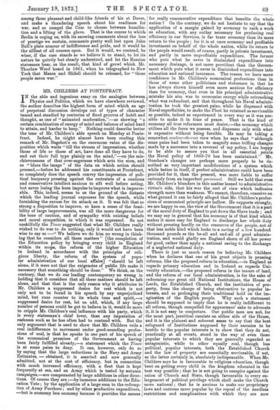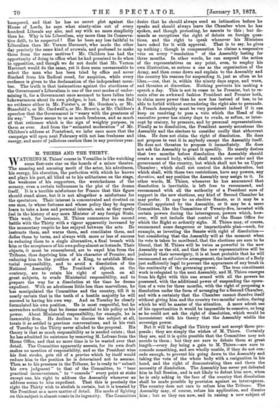MR. CHILDERS AT PONTEFRACT.
TN the able and ingenious essay on the analogies between 1. Physics and Politics, which we have elsewhere reviewed, the author describes the highest form of mind which an age of perpetual discussion develops out of types of character tamed and steadied by centuries of fixed grooves of habit and thought, as one of "animated moderation,"—as showing "a certain combination of energy of mind and balance of mind hard to attain, and harder to keep." Nothing could describe better the tone of Mr. Childers's able speech on Monday at Ponte- fract. Indeed, he iiiight almost have been reading this remark of Mr. Bagehot's on the enormous value of the dis- position which waits "till the stream of impressions, whether those of life or those of art, have done all they have to do, and cut their full type plainly on the mind,"—on the mis- chievousness of that over-eagerness which acts too soon, and so "blurs the image" of the data on which action should proceed,—before he addressed his constituents at Pontefract, so completely does the speech convey the impression of poli- tical buoyancy pressing against the restraints of a cautious and conservative intellect anxious to sift well before acting, but never losing the keen impulse to improve what is improve- able. This, indeed, seems to us the ground of the distaste which the leading journal expresses for the speech, while furnishing the excuse for its attack on it. It was felt that so strong a disposition to improve, so keen a sense of the feasi- bility of large improvements, was all the more dangerous for the tone of caution, and of sympathy with existing beliefs and moral sympathies, in which it was expressed. So not unskilfully the Times suggested that what Mr. Childers really wished to do was to do nothing, only it would not have been wise to say so :—" We believe we do him no wrong in think- ing that he considers all these matters" [the completion of the Education policy by bringing every child in England within its scope, the reform of the higher Education in Ireland in accordance with the principles of reli- gions liberty, the reform of the system of popu- lar administration of our local affairs] "should be left alone, if it were not that the exigencies of public life make it necessary that something should be done." We think, on the contrary, that we do our leading contemporary no wrong in holding that it considers that all these matters should be left alone, and that that is the only reason why it attributes to Mr. Childers a suppressed desire for rest which is not only not to be found in -his speech by any unprejudiced mind, but runs counter to its whole tone and spirit,—a suppressed desire for rest, let us add, which, if any large number of persons could be got to believe in it, would do more to cripple Mr. Childers's real influence with his party, which is every statesman's chief lever, than any imputation of rashness such as he has often had to contend with. But the only argument that is used to show that Mr. Childers veils a real indifference to movement under good-sounding profes- sions of zeal, is that he speaks in one part of his speech of the economical promises of the Government as having been fairly fulfilled already,—a statement which the Times is at some pains to deny. It can, however, only do so by saying that the large reductions in the Navy and Army Estimates, — obtained, it is asserted and now generally admitted, not at the cost of efficiency, but in connection with much increased efficiency, with a fleet that is kept frequently at sea, and an Army which is tested by autumn campaigns,—are compensated by large additions in other direc- tions. Of course they are ;—by immense additions to the Edu- cation Vote ; by the application of a large sum to the redemp- tion of Army Purchase ; and by other productive expenditure, —but is economy less economy because it provides the means for really remunerative expenditure that benefits the whole nation ? On the contrary, we do not hesitate to say that the application of a margin gained by economy to such a work as education, with any outlay necessary for producing real efficiency in our Services, is far truer economy than its mere return to the people; for it is at once economy and profitable investment on behalf of the whole nation, while its return to the people would result, of course, partly in private investment, and partly in mere unprofitable expenditure. The farmer who puts what he saves in diminished expenditure into necessary drainage, is not more provident than the Govern- ment which puts what it saves in diminished expenditure into education and national insurance. The reason we have more confidence in Mr. Childers's economical professions than in those of some other politicians and statesmen is, that he has always shown himself even more anxious for efficiency than for economy, that even in his principal administrative mistake his aim was to economise energy while retrenching what was redundant, and that throughout his Naval adminis- tration he took the greatest pains, while he dispensed with Naval superfluities, to make the Fleet he retained as serviceable as possible, indeed as experienced in every way as it was pos- sible to make it in time of peace. That is the kind of economy all true reformers most desire,—the economy which utilises all the force we possess, and dispenses only with what is expensive without being forcible. He may be taking a somewhat couleur-de-rose view when he says that "although some pains had been taken to magnify some trifling changes made by a successor into a reversal of my policy, I am happy to be able to assure you that in all essential points the Naval policy of 1869-70 has been maintained." Mr. Goschen's changes are perhaps more properly to be de- scribed as very important modifications of a system which while better in itself, if perfect administrators could have been provided for it, than the present, was more liable to suffer seriously from an imperfect personnel. Still we hold that even Mr. Childers's blunders in this matter leaned to administrative virtue's side, that his was the sort of view which indicates strength more than weakness. We cannot, therefore, conceive on what ground it can be fairly alleged that Mr. Childers's profes- sions of economical principle are hollow. He supports strongly, we are happy to see, the view of the Government that it is apart of the moral duty of England to put down the Slave trade ; and we may say in general that his economy is of that kind which makes it more easy for England to discharge her whole duty without pressing hardly on the resources of the people, not of that less noble kind which looks to a saving of a few hundred thousand pounds as the be-all and end-all of good adminis- tration, and would gladly see England shorn of all her power for good, rather than apply a national saving to the discharge of a neglected national duty.
There is just as much reason for believing Mr. Childers when he declares that one of his great objects in pressing reforms, like the proposed reform in education,—in England as regards primary education and in Ireland as regards Uni- versity education,—the proposed reform in the tenure of land, and the reform of our local administration, is for the sake of redeeming our great "old National Institutions, the House of Lords, the Established Church, and the institution of pro- perty, from the charge of being obstructive to popular in- terests, and so prolonging their traditional hold on the im- agination of the English people. Why such a statement should be supposed to imply that he is really indifferent to all reform, though compelled for appearance' sake to advocate it, it is not easy to conjecture. Our public men are not, for the most part, jesuitical casuists on either side of the House, and it is the plainest and soberest sense to say that the best safeguard of Institutions supposed by their enemies to be hostile to the popular interests is to show that they do not, practically at all events, stand in the way of even those popular interests to which they are generally regarded as antagonistic, while to other equally real, though less political, popular interests, both the Established Church and the law of property are essentially serviceable, if not, as the latter certainly is, absolutely indispensable. When Mr.
Childers says he is favourable to religious education, though bent on getting every child in the kingdom educated in the best way possible ; that he is not going to conspire against the union of Church and State, though favourable to every en- largement of political privilege which shall make the Church more national ; that he is anxious to make our proprietary laws and customs more popular by the repeal of the needless restrictions and complications with which they are now
hampered, and that he has no secret plot against the House of Lords, he says what ninety-nine out of every hundred Liberals say also, and say with no more simplicity than he. Why is his Liberalism, any more than its Conserva- tive drift, to be suspected I Has he been any less faithful to Liberalism than Mr. Vernon Harcourt, who made the other day precisely the same kind of avowals, and professed to make them from the same motives ? Mr. Childers has had the opportunity of doing in office what he had promised to do when in opposition, and though we do not doubt that Mr. Vernon Harcourt would do the same, yet it does seem unreasonable to select the man who has been tried by office and never flinched from his Radical creed, for suspicion, while every credence is given to the declamation of the independent mem- ber. The truth is that insinuations against the sturdiness of the Government's Liberalism is one of the nest modes of under- mining it, for a Government once assumed to have fallen into lukewarmness about its own pledges, is lost. But we can find no evidence either in Mr. Forster's, or Mr. Goschen's, or Mr. Stansfeld's, or Mr. Cardwell's, or Mr. Bruce's, or Mr. Childers's speeches that the Government is "weary with the greatness of its way." There seems to us as much freshness, and as much of that reticence which is the sign of weighty purpose, in them as ever. And from the "animated moderation" of Mr. Childers's address at Pontefract, we infer once more that the campaign will open next February with not less freshness and energy, and more of judicious caution than in any previous year.



































 Previous page
Previous page